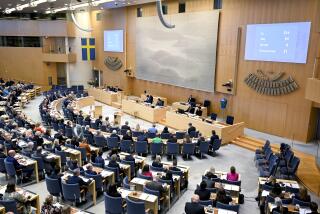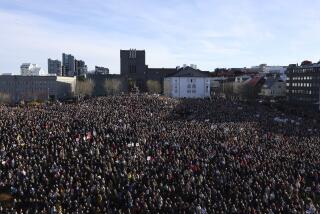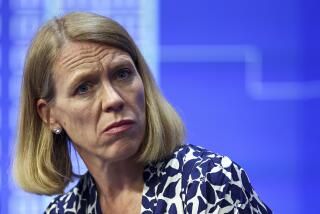Egalitarian Scandinavia Hasn’t Stamped Out Sexism
- Share via
OSLO — Sexism is supposed to be dead in the egalitarian Nordic countries, but it still haunts the home and corporate boardrooms.
The socialist democracies of northern Europe take pride in 20 years of tough laws and affirmative action against sex discrimination. Norway, Sweden, Denmark, Finland and Iceland rank high in surveys on the status of women.
Citizens publicly embrace equality and women challenge men for political leadership.
Despite that, career women still trail men in pay and opportunity. They also handle most of the housework, although one survey indicated that Swedish men do more of it than other men in the world.
“Everyone agrees it is unfair for women to earn less than men, but women earn less anyway,” said Brit Fougner Foerde of the Norwegian Equal Status Council.
Women have made striking gains in politics, which some attribute partly to men leaving government for corporate jobs with more pay and power.
Norway has Prime Minister Gro Harlem Brundtland. Vigdis Finnbogadottir is president of Iceland. But no woman heads a major corporation in a Nordic country.
Swedish activist Eva Oskarsson said feminist street protests of the 1970s have given way to quiet struggle, and “equality now is a part of everyday life.”
Everyday life, however, is not equal. A study found that most Norwegian women have jobs, but still do up to four times as much housework as men.
Laws guarantee equal pay, but average salaries for women lag 10% to 25% behind men and the gap is growing, said a study by the Nordic Council of Ministers.
Job advertisements often woo women for top jobs, but men have more than 90% of executive jobs from middle management up.
“Bosses, generally men, tend to choose someone they know . . . men,” said Agnete Andersen of Denmark’s Equality Council.
Polls show that faith in politicians eroded during the 1980s. Some men are moving from politics to private industry.
Birgitta Olausson, former vice president of the Fredrika Bremer Women’s League in Sweden, suggested that the power of government jobs has diminished because of the increasing number held by women.
“The more women move in somewhere, the lower the pay and status becomes,” she said. “When 40% of Parliament members were women, the power moved over to the commissions, where 16% were women.”
Nordic countries have equal status ombudsmen to ensure fair play by their governments, some of which pay “public service benefits” to keep male bureaucrats from switching to private industry.
Brundtland, 51, became Norway’s first woman prime minister in 1981. She has been called a “superwoman” because of her stamina and willingness to fulfill both her government duties and traditional female responsibilities.
Other women don’t want to be superhuman. They want their jobs to change.
Female legislators in Norway pressed for shorter summer recesses so the work could be spread over a longer session. That would have meant fewer night meetings and more time with their families.
Male members of Parliament kept the proposal from reaching a vote.
Women also have to contend with male tradition.
Defense Minister Elisabeth Rehn of Finland had to ask male colleagues to stop their custom of meeting naked in saunas to discuss government affairs.
Finnish newspapers boasted when a world record 38.5% of Parliament seats went to women in the March elections. A year earlier, they had run stories about the color of Rehn’s nail polish.
Activists say things may change in the home because younger couples share more household chores, setting new role models for children.
Brundtland tells of a 6-year-old boy who was confused when shifts in political power forced her to resign during her second term in 1989 and Jan P. Syse took over.
“How can a man be prime minister?” the boy asked his mother.
More to Read
Sign up for Essential California
The most important California stories and recommendations in your inbox every morning.
You may occasionally receive promotional content from the Los Angeles Times.










